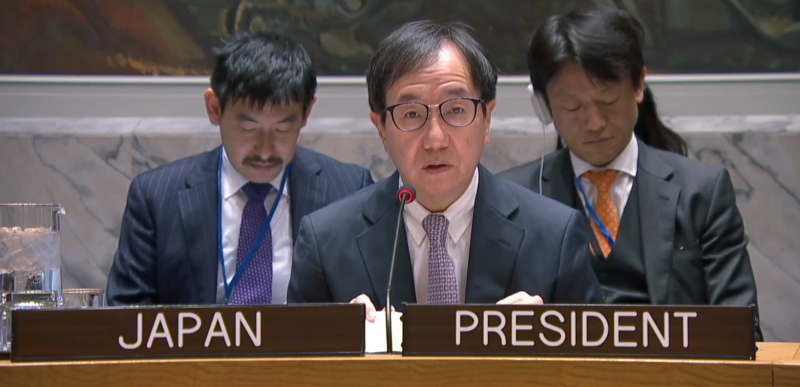「紛争予防の推進―女性と若者を含む全てのアクターのエンパワーメント」に関する安保理公開討論における山﨑大使ステートメント
令和6年3月13日

I sincerely thank Ms. DiCarlo, Under-Secretary-General of the United Nations; Ambassador Danese, Permanent Representative of Brazil, in his capacity as the Chair of the Peacebuilding Commission (PBC); Professor Williams; and Ms. Bhagwan-Rolls for their insightful briefings.
Peace can be sustained when we can prevent conflicts from erupting and prevent their resurgence once they end. If a conflict is prevented, we can avoid the human tragedy and the devastating political, socio-economic, and financial impacts that it brings. By contrast, it is far more difficult to manage conflicts once they break out and restore peace. That is one of the reasons why the Security Council is determined to enhance the effectiveness of the UN in preventing conflict.
Effective prevention requires comprehensive approaches that are tailored to each context and reflect the needs and opinions of all people on the ground. In his “New Agenda for Peace”, the Secretary-General emphasized the importance of conflict prevention and recommended all States, not just conflict-affected or fragile ones, to invest in national prevention capacities involving the whole of society and formulate national strategies for prevention.
Today’s open debate is dedicated to hearing ideas from Member States on what role the Security Council can play in effectively supporting nationally-led efforts in prevention, and in contributing to discussions for the Summit of the Future and the 2025 Review of the Peacebuilding Architecture.
Colleagues,
Japan would like to raise three points on how the Security Council can more effectively prevent conflict and its recurrence.
First, the Council should recognize that a sustainable peace cannot be achieved just by ceasing violence, but by building resilience on the ground and upholding the human dignity of every individual.
This can be realized through a long-term, comprehensive, and inclusive approach that covers mid- and post- conflict stages, ensures the humanitarian-development-peace nexus, and empowers all people including women and youth by making sure of their full, equal, and meaningful participation. The mandates of peace operations should include support for capacity building for the host country and its people to prevent recurrence of conflict.
As the 68th annual Commission on the Status of Women (CSW68) has started, the Council should also reaffirm our commitment to uphold the Women, Peace and Security agenda.
Second, the Security Council must enhance collaboration to fully utilize the UN toolbox. The Council can promote the empowerment and participation of all actors through collaboration between peace operations, other UN agencies, and beyond. Such closer coordination will enable the Council to translate early warnings of potential conflicts into decisive preventive action and prepare more feasible and concrete transition plans for peace operations well ahead of their withdrawals. Japan is currently discussing with relevant UN bodies on how to effectively implement collaborative support for nationally-led prevention initiatives on the ground.
Third, the Council must utilize the Peacebuilding Commission to discuss nationally-led prevention in detail, since the PBC is both an advisory body to the Council as well as a hub to convene national authorities and actors, other UN bodies, regional organizations, IFIs, and more. Japan, as the informal coordinator between the PBC and the Council this year, will contribute to their strengthened cooperation, together with the members of both bodies.
To conclude, I would like to reiterate Japan’s continuous commitment to utilizing the capacities of the United Nations to advance prevention and peacebuilding for sustainable peace.
